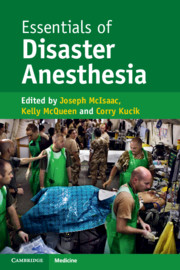Book contents
- Essentials of Disaster Anesthesia
- Essentials of Disaster Anesthesia
- Copyright page
- Contents
- Contributors
- Preface
- Disclaimer
- Chapter 1 Disaster Anesthesia
- Chapter 2 Preparing to Deploy to a Remote Disaster
- Chapter 3 Principles of Emergency and Trauma Surgery
- Chapter 4 Total Intravenous Anesthesia in Disaster Medicine
- Chapter 5 Inhaled Anesthetics and Draw-Over Devices in Disaster Response
- Chapter 6 Airway Management
- Chapter 7 Vascular Access, Hydration, and Fluids
- Chapter 8 Critical Care Delivery for Disasters in Austere Environments
- Chapter 9 Children in Disasters
- Chapter 10 Special Populations: Children
- Chapter 11 Laboratory Tests and Blood Banking
- Chapter 12 High-Altitude Physiology and Anesthesia
- Chapter 13 Disaster: Mental Health Effects, Responses, and What Clinicians Can Do
- Chapter 14 Considerations When Working with Children and Families
- Chapter 15 Chemical and Radiologic Exposures in Trauma and Disasters
- Chapter 16 Pain in Disasters
- Chapter 17 Radiology in the Austere or Disaster Environment
- Chapter 18 Communications
- Chapter 19 Security in Disaster Anesthesia
- Chapter 20 International Humanitarian Law
- Chapter 21 Operation Tomodachi: Anesthetic Implications
- Chapter 22 Austere Obstetric Anesthesia
- Chapter 23 Pharmacy in Disaster Anesthesia
- Chapter 24 Regional Anesthesia in Disaster Circumstances
- Chapter 25 Power and Light: Impact of Electrical Systems Failure on the Delivery of Anesthetic Care
- Book part
- Index
- References
Chapter 25 - Power and Light: Impact of Electrical Systems Failure on the Delivery of Anesthetic Care
Published online by Cambridge University Press: 23 June 2020
- Essentials of Disaster Anesthesia
- Essentials of Disaster Anesthesia
- Copyright page
- Contents
- Contributors
- Preface
- Disclaimer
- Chapter 1 Disaster Anesthesia
- Chapter 2 Preparing to Deploy to a Remote Disaster
- Chapter 3 Principles of Emergency and Trauma Surgery
- Chapter 4 Total Intravenous Anesthesia in Disaster Medicine
- Chapter 5 Inhaled Anesthetics and Draw-Over Devices in Disaster Response
- Chapter 6 Airway Management
- Chapter 7 Vascular Access, Hydration, and Fluids
- Chapter 8 Critical Care Delivery for Disasters in Austere Environments
- Chapter 9 Children in Disasters
- Chapter 10 Special Populations: Children
- Chapter 11 Laboratory Tests and Blood Banking
- Chapter 12 High-Altitude Physiology and Anesthesia
- Chapter 13 Disaster: Mental Health Effects, Responses, and What Clinicians Can Do
- Chapter 14 Considerations When Working with Children and Families
- Chapter 15 Chemical and Radiologic Exposures in Trauma and Disasters
- Chapter 16 Pain in Disasters
- Chapter 17 Radiology in the Austere or Disaster Environment
- Chapter 18 Communications
- Chapter 19 Security in Disaster Anesthesia
- Chapter 20 International Humanitarian Law
- Chapter 21 Operation Tomodachi: Anesthetic Implications
- Chapter 22 Austere Obstetric Anesthesia
- Chapter 23 Pharmacy in Disaster Anesthesia
- Chapter 24 Regional Anesthesia in Disaster Circumstances
- Chapter 25 Power and Light: Impact of Electrical Systems Failure on the Delivery of Anesthetic Care
- Book part
- Index
- References
Summary
Over the past 50 years, surgery, physiologic monitoring, and the delivery of anesthesia has undergone a high technology revolution. The finger on the pulse, manual blood pressures, and precordial stethoscopes have given way to advances in electrocardiography, automated blood pressure, pulse oximetry, end-tidal capnography, and transesophageal echocardiography, just to name a few of the major advances. As automation has progressed, anesthetic practice and surgery have become extremely dependent upon a reliable power supply for clinical operations. The Joint Commission (TJC) standards require routine testing of the hospital backup power supply (EC.02.05.07.04); 12 times a year, at intervals of not less than 20 days and not more than 40 days, the hospital tests each emergency generator for at least 30 continuous minutes. The completion dates of the tests are documented in the generator and automatic transfer switch (ATS) testing logs by the technicians performing the tests. Additional specifics are addressed in TJC standards on load testing and performance.
- Type
- Chapter
- Information
- Essentials of Disaster Anesthesia , pp. 236 - 243Publisher: Cambridge University PressPrint publication year: 2020
References
ecurrents.dis.04eb1dc5e73dd1377e05a10e9edde673
.Google Scholar


